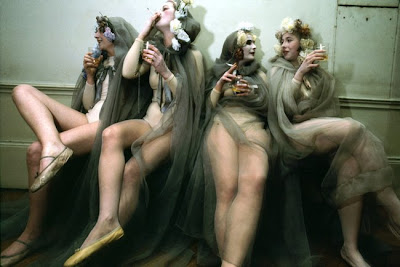Who are the French today? What is their character, their identity, their reality; what are their aspirations?

Luc Choquer went about to answer these questions in a manner that recalls August Sander. The result is a sort of typography of contemporary French people, and by extension, of French life. Choquer has taken hundreds of photographs over the years, entered homes, asked people of all walks of life to pose for him. He often uses flash, slightly underexposing a picture's background, increasing its saturation, and using flash on the foreground and the subject(s), creating a slightly surreal effect, lifting the subjects off the background.

After seeing it, what can be said? In a conversation with my friend Marc who saw it with me , we argued about whether Choquer's images showed something specifically French. He felt that the pictures could mostly have been taken somewhere else, that the people and their environments lacked a specifically French quality.
Luc Choquer went about to answer these questions in a manner that recalls August Sander. The result is a sort of typography of contemporary French people, and by extension, of French life. Choquer has taken hundreds of photographs over the years, entered homes, asked people of all walks of life to pose for him. He often uses flash, slightly underexposing a picture's background, increasing its saturation, and using flash on the foreground and the subject(s), creating a slightly surreal effect, lifting the subjects off the background.
After seeing it, what can be said? In a conversation with my friend Marc who saw it with me , we argued about whether Choquer's images showed something specifically French. He felt that the pictures could mostly have been taken somewhere else, that the people and their environments lacked a specifically French quality.
So, indeed, the people in the pictures look like any other, pretty much. Dancers during a break, kids by the swimming pool, middle class couples in the gardens of their representative houses with pools, another couple in their beige living room on a pompous fauteuil and a fake window, teenagers on the street--one can almost hear their "urban" music (or whatever that overproduced, sampled hiphoprappop shite is called in France... sorry, my age shows, I know)--and rich people at a horse race that look like any rich people at any horse race. With minor variations, they could be German or English or American or Dutch or in any industrialised Western country. I would not have recognised them as particularly French, either. France to me means also buildings, an infuriatingly difficult language to penetrate, an incredible sense of beauty, elegance and presentation (and vanity), a visible pride in public spaces and public institutions, and stunning wild landscapes, food and wine, and much more. Little of this shows in the pictures.

Choquer's images are representations of the aspirations of French society. It is a distinctly middle class vision, this idea of risig above one's station in life, of deciding to be "someone". And it so happens that those aspirations are pretty much the same as in any other Western country.
What surprises me is how readily I identify clues about social class, educational level, or certain attitudes. I respond by finding certain people or features--clothing, living environment, for example--attractive, but others not. Indicators of masculinity, assertiveness, independence, intelligence, health make it likely that I regard the people in the image with positive feelings because they correspond to my own aspirations, to how I would like to see myself or to be seen. And again, small things can turn me off--trying too hard, artifice, obvious vanity. These are the things that I was taught to detest from a young age, and, not surprisingly, most people that I associate with. Cue "The White Ribbon" by Michael Haneke for more on my northern German Protestant background.
Corresponding to Choquer's typography, there are advertisements that target these groups of people and feed their aspirations. Looking at the pictures, the ads and the products that these French people consume are easy to imagine. I may not be familiar with the brands, but I know how they are placed and what social prestige they may carry. I am aware how well I speak and comprehend that language of consumerism because it is absolutely international, the Esperanto of globalisation. Mass consumption requires mass taste. Yet, this language to Marc or me--and I suspect to many others--is not a language adding to the complex canon of meanings, traditions, images, and cultural signifiers familiar to us; quite the opposite, it subtracts. We lose a part of our cultural identity and thus a part of our bond with our patrimony and heritage and those that used to share this with us.
The face of modern France is a face like any other?
